Samaaro + Your CRM: Zero Integration Fee for Annual Sign-Ups Until 30 June, 2025
- 00Days
- 00Hrs
- 00Min
The untapped potential of event data rests at the heart of this data-driven revolution in the hyper-connected world of today. Samaaro, a pioneering Event Management System (EMS), acts as a catalyst, facilitating the realization of event data’s inherent value and indicating in a moment of new possibilities. In this blog, we will delve into the profound significance of event data, the challenges it presents, and the transformative benefits offered by Samaaro.
Event data is an indispensable resource for modern businesses, providing exceptional visibility into user conduct, trends in the market, and operational effectiveness. Event data is used in a variety of sectors, including finance, healthcare, and marketing, to improve consumer experiences and streamline operations.
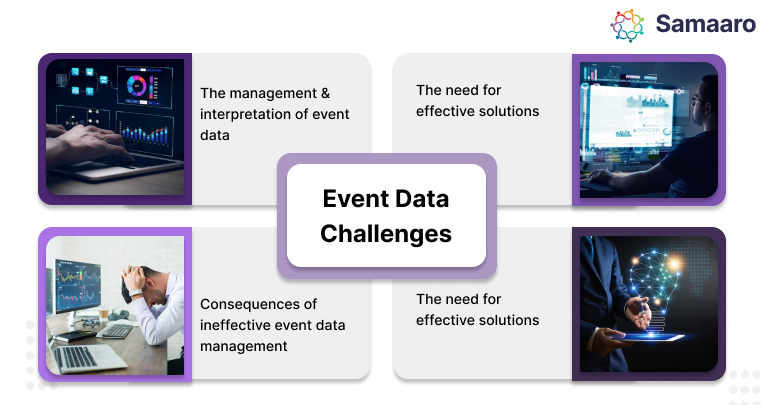
A. The management and interpretation of event data
Efficient administration and interpretation of event data pose significant challenges due to their immense volume and intricate nature. The complexity of extracting meaningful insights is made harder by the unstructured nature of data streams and the requirement for real-time processing.
B. Consequences of ineffective event data management
Mismanagement of event data can result in significant ramifications, including the failure to capitalize on opportunities, prolonged response times, and compromised decision-making processes. Frequently, the potential insights required for fostering growth and innovation remain elusive, resulting in a disconnect between data and strategies that can be effectively implemented.
C. The need for effective solutions
Recognizing the urgent need for solutions that not only manage but also extract significant value from event data, Samaaro steps into the spotlight. Designed to address the intricacies associated with event data, Samaaro serves as a bridge between raw data and actionable intelligence.
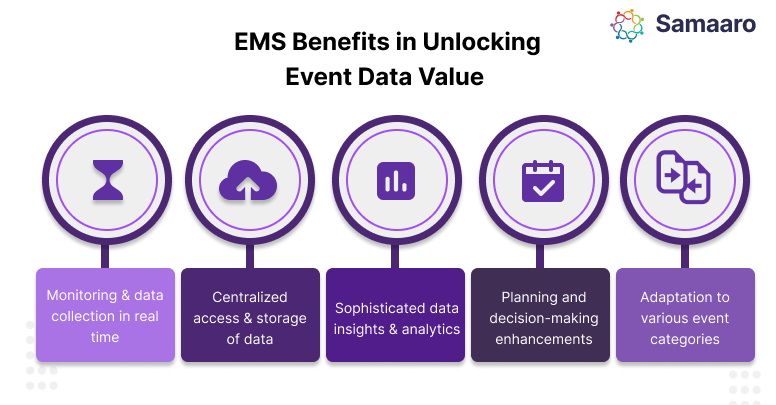
A. Monitoring and data collection in real time
By capturing and processing event data in real-time, Samaaro’s EMS provides organizations with an uninterrupted flow of information. This functionality empowers organizations to maintain a competitive edge by promptly addressing emerging trends and prospective challenges. Moreover, the intuitive interface of the platform guarantees that the data gathered is not only comprehensible but also capable of being implemented.
B. Centralized access and storage of data
The foundation of efficient data management is centralization, and Samaaro effortlessly accomplishes this. A centralized archive stores all pertinent information, thereby simplifying access and obviating the difficulties associated with dispersed data sources. In addition to streamlining data administration, this centralized approach facilitates cross-functional decision-making and improves collaboration.
C. Sophisticated data insights and analytics
Beyond fundamental data storage, Samaaro integrates comprehensive analytics tools that convert unprocessed data into practical insights. By incorporating machine learning algorithms and predictive analytics, Samaaro enables organizations to gain insights into trends, recognize favorable circumstances, and enhance their success-oriented strategies.
D. Planning and decision-making enhancements
Samaaro empowers decision-makers to make well-informed choices by utilizing data-driven insights in real-time. Every decision, encompassing resource allocation and marketing strategies, is supported by an exhaustive comprehension of the event environment. Samaaro guarantees that comprehensive reports and visualizations are provided to decision-makers, thereby enabling them to engage in more efficient planning and implementation.
E. Adaptation to various event categories
Samaaro demonstrates its understanding that not all events are equivalent by providing customizable solutions that are specifically designed for a wide range of event categories. The platform successfully adjusts to the distinct data needs of various types of gatherings, including conferences, webinars, trade shows, and virtual events, thereby guaranteeing the production of pertinent and implementable insights.
For its SMOPS-2023: International Conference on Spacecraft Mission Operations, ISRO faced various challenges and sought an advanced event technology platform to enhance the overall attendee experience. A key concern was effective data tracking, as attendees struggled to make informed decisions due to limited online event information. ISRO aimed to elevate its event monitoring system by leveraging cutting-edge technology for precise data collection and comprehensive parameter monitoring. Samaaro stepped in to address these needs. Recognizing the significance of data security, Samaaro designed a platform where all information was exclusively accessible to moderators. The solution provided real-time access to data and downloadable reports, ensuring a seamless and secure event management experience for ISRO.
Samaaro emerges as a transformative force for organizations seeking to unlock the true potential of event data. As we continue to navigate the complexities of modern business, Samaaro stands as a beacon, illuminating the path towards data-driven success. In a world where data reigns supreme, Samaaro empowers organizations to not only collect and manage data but to extract actionable insights that propel them towards unparalleled success. Don’t wait! Start your free trial now!
Events provide an opportunity for people to engage in networking, exchange knowledge, and forge everlasting memories. However, one key aspect determines the outcome of any event: efficient event registration and ticketing. Although it may appear to be an inconsequential aspect, it has the potential to significantly impact the success or failure of your event.
The registration and ticketing process is the initial point of contact for attendees at your event. A seamless and user-friendly system can leave a positive mark, while a complicated and tedious process can deter potential attendees. Additionally, effective ticketing has a significant impact on the revenue and management of your event.
A suite of features provided by Samaaro are intended to streamline the complete process, from beginning to end. Samaaro can accommodate your specific event needs, whether you are organizing a small workshop or a large-scale conference.
This blog will provide an in-depth analysis of Samaaro, including an examination of its features, customization capabilities, past success, and the numerous advantages it presents to organizers. By the time you’re through reading, you’ll understand why Samaaro is the ultimate choice for anyone looking to elevate their event registration and ticketing game.
Samaaro boasts a robust set of features that make event registration and ticketing a breeze:
Landing Page
First impressions matter. With Samaaro, you can create a stunning event landing page that captures your event’s essence. By personalizing the landing page to align with the event’s branding and theme, one can establish an online presence that is both aesthetically pleasing and unified.
The landing page can include significant event information, including but not limited to the date, venue, timetable, speaker biographies, sponsors, and hyperlinks to supplementary resources such as downloadable materials or pertinent websites. You facilitate attendees’ enthusiasm for your event and enable them to locate the information they seek without difficulty by arranging and aesthetically presenting this data.
Customized ticketing options
Samaaro’s customized ticketing options provide event organizers with the flexibility to tailor their ticketing strategy to the specific needs of their event. Depending on your event type and audience, you can create a variety of ticket categories, pricing tiers, and packages to attract a diverse range of attendees.
This customization ensures that your event is accessible and appealing to a broader audience, increasing the chances of achieving higher ticket sales. By accommodating different preferences and budgets, you can maximize your event’s potential for success.
Payment options
Samaaro provides support for a range of payment gateways, enabling participants to conveniently and effortlessly complete the registration process by utilizing their preferred method of payment, be it PayPal, credit cards, or other viable options. Consequently, this increases the revenue and ticket sales for your event.
Moreover, accommodating a multitude of currencies and payment gateways, Samaaro’s comprehensive payment system is appropriate for both domestic and international gatherings. With the support for multiple currencies and a variety of payment methods, your event will be able to effortlessly process payments from around the world and appeal to a global audience.
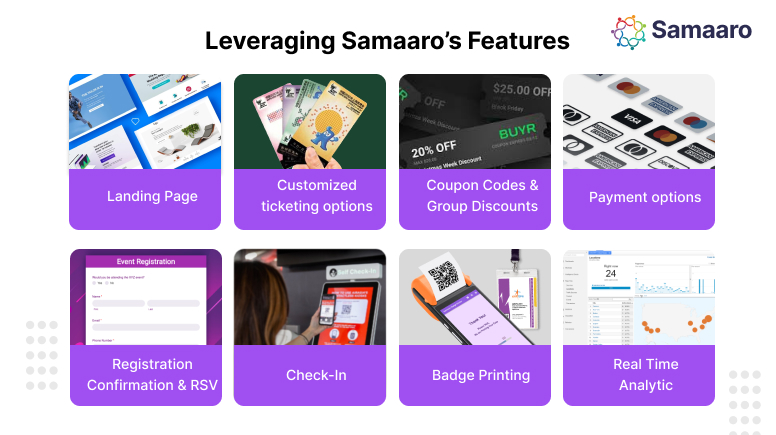
Registration Confirmation & RSVP
Upon registration, participants receive confirmation notifications through multiple channels, including email, SMS, and WhatsApp, offering flexibility and convenience for attendees. Additionally, event organizers have the option to streamline the process further by uploading a list of anticipated attendees and prompting them to RSVP in advance. This feature simplifies logistics and helps organizers better prepare for the event.
Check-In
Efficient check-in processes are essential for the smooth operation of any event. Samaaro offers a check-in feature that simplifies and streamlines the check-in process for attendees. With Samaaro’s check-in system, attendees can quickly and conveniently check in upon their arrival at your event. The intuitive interface ensures a hassle-free experience, reducing the likelihood of long lines and ensuring that potential attendees become confirmed guests.
Badge Printing
In addition to efficient check-in, Samaaro also offers a badge printing feature that adds a professional touch to your event while further enhancing the check-in process.
When attendees arrive at your event, they can receive personalized identification badges or badges with QR codes, which can be quickly scanned for entry. These badges can be customized to include the attendee’s name, affiliation, and any other relevant information, providing a personalized touch to the event experience. Moreover, Samaaro’s badge printing feature automates the badge creation process, reducing the potential for human error and saving precious time.
Real Time Analytics
Samaaro provides event organizers with the ability to access critical data and insights in real-time through its analytics capabilities. By delivering a consistent flow of data regarding attendee engagement, behavior, and other critical metrics, this functionality empowers event organizers to formulate well-informed decisions based on empirical evidence throughout the course of the event.
Real-time analytics provide numerous advantages, including the capacity to assess session popularity, monitor attendance figures, and detect emerging trends or challenges that may arise throughout the event. Organizers may reallocate resources in response to an unanticipated overcrowding of a specific session, for instance, by relocating to a room of greater capacity or modifying the timetable to replicate the session. On the contrary, in the event that a session fails to attract sufficient attendance, organizers may contemplate consolidating it with another or increasing its promotion.
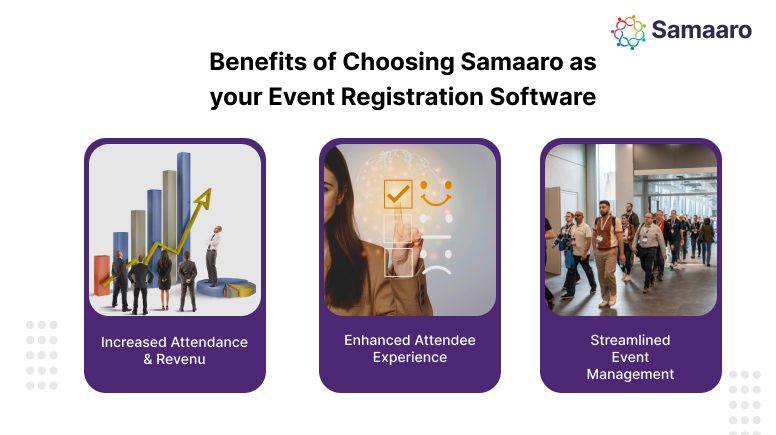
A. Increased Attendance and Revenue
Samaaro is an assured method of increasing revenue and attendance by streamlining the registration process and providing a diverse selection of payment methods and ticket choices. Your event’s financial success is virtually assured with increased attendance and streamlined ticket sales.
B. Enhanced Attendee Experience
Samaaro’s benefits extend beyond the event organizer to the attendees as well. It significantly improves their experience. Your attendees will enjoy themselves and have a favorable perception of your business because of a streamlined registration procedure, badge printing on-site, and real-time information.
C. Streamlined Event Management
Samaaro streamlines the process of event management, which can otherwise be a logistical maze. You can adapt your event in real time and make decisions based on data with the assistance of real-time analytics and personalization. For the event organizers, this results in a more structured and less anxious day.
TEDx Hyderabad
TEDxHyderabad encountered considerable difficulties in controlling the number of attendees and paying excessive payment gateway costs. They were unable to evaluate marketing activities because there was no efficient way to track coupon-based registrations. Samaaro cut costs and integrated Indian payment alternatives into a comprehensive ticketing system to address these problems. Group participation and resource allocation were encouraged with flexible discount codes and vouchers. Utilizing email and WhatsApp as part of Samaaro’s event marketing strategy increased registration and participant engagement. Over 1,250 people registered, 136 different types of coupons were used, the check-in process took only 75 minutes, and there were over 40,000 communications. These were outstanding results.
Major Agricultural Exhibition in Brazil
Samaaro came up with a novel way to handle an 80,000-person farming event with a variety of linguistic backgrounds. Language obstacles were removed when individuals could register using customizable forms available in English, Portuguese, and Spanish. Twelve check-in counters were manned by volunteers with tablets and an easy-to-use registration system from Samaaro, which let the registration process run smoothly. Farmers that were knowledgeable could join without any problems. Due to effective technology and planning, 800 farmers were able to register at a time at each kiosk in an average of just 45 seconds. This case study demonstrates how well-thought-out preparation and cutting-edge technology can produce a seamless, welcoming event experience.
Unlimited Events & Unlimited Tickets
With Samaaro’s free ticketing solution, you can host an unlimited number of events, from workshops to concerts, with no restrictions. But that’s not all! You can also sell an unlimited number of paid tickets for your events, giving you complete flexibility to create and manage various ticket types. This feature alone sets Samaaro apart, as many other platforms impose limitations on event and ticket numbers.
Unlimited Tickets and Coupon Codes
Samaaro empowers you with endless possibilities by offering unlimited tickets and coupon codes. Customize your ticketing strategy and run promotions without constraints. Your creativity knows no bounds when you work with Samaaro.
Transparent Pricing
One of the most outstanding features of Samaaro is its transparent pricing structure. With only a 3% platform convenience fee and no hidden charges, you’ll always know what you’re paying for. Unlike other event management companies that surprise you with additional costs, Samaaro ensures you have full clarity on your expenses.
Custom Registration Forms
Your event’s registration process can be a crucial element in creating a positive impression. Samaaro empowers you to design custom registration forms that capture essential attendee information. Tailor forms to gather insights into attendee preferences, demographics, or any data specific to your event’s requirements. This information can be invaluable for planning future events and fine-tuning your marketing strategy.
Personalized Registration Emails
First impressions matter, and personalized registration emails can set the tone for your event. With Samaaro, you can craft and send tailored emails to your attendees, offering a personal touch that conveys your appreciation and commitment to their event experience. A positive and personalized interaction can go a long way in building attendee loyalty.
Samaaro’s adaptability and extensive feature set enable it to meet the specific needs of various types of events. It is not a one-size-fits-all solution; instead, it can be tailored to address the unique requirements of your event. From increased attendance and revenue to enhanced attendee experiences and streamlined event management, Samaaro brings a world of possibilities to the table, experience it today! Start your free trial now!
The fact that “98% of attendees at live events engage in content capture” speaks volumes.
In today’s fast-paced and ever-evolving business landscape, finding innovative ways to capture your audience’s attention is paramount. This is where event marketing comes into play. Event marketing is not just about throwing a party or organizing a conference; it’s a strategic approach that can elevate your brand, engage your audience, and drive success like never before.
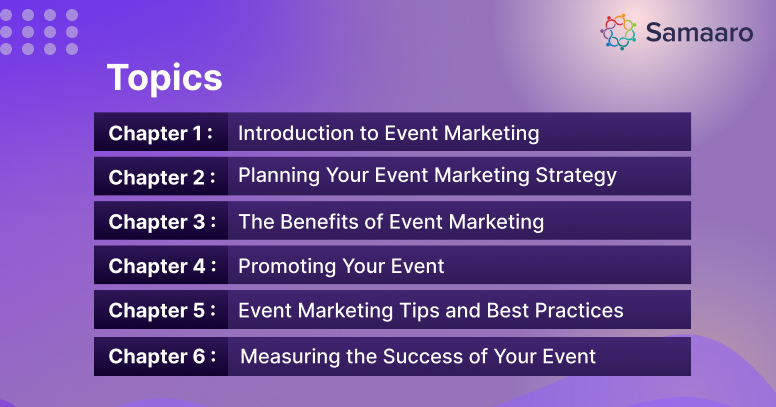
In recent times, the business world has undergone a profound transformation. The emergence of digital marketing may give the impression that conventional approaches to engagement have been sidelined. However, there is a resurgence of interest in current events, and with good reason. People are always curious about authentic, in-person encounters. They desire a personal connection with brands, and events offer the ideal platform to do so.
Event marketing is no longer an option but a necessity in the modern era. By breaking through the digital noise, events enable you to leave an indelible mark on your audience. They provide a platform to exhibit one’s products or services, foster connections, and cultivate a devoted clientele.
This comprehensive guide is designed to be your go-to resource for planning, executing, and measuring the impact of your event marketing efforts as an event organizer. We’ll walk you through the entire process, from understanding what event marketing is, to setting clear goals, promoting your event, ensuring seamless execution, and measuring success.
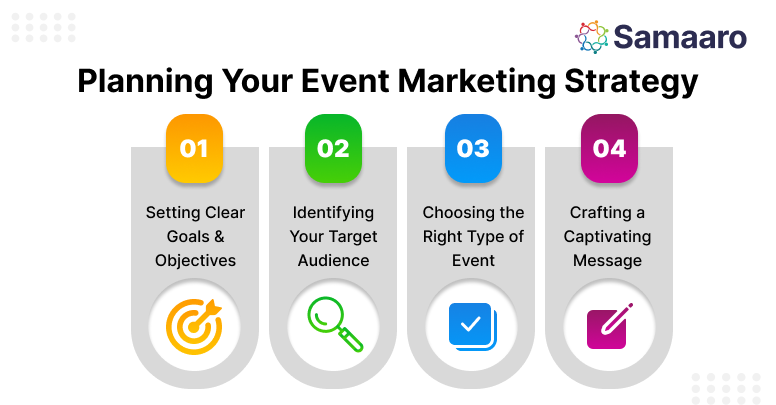
Having a well-thought-out plan in place is crucial before you start preparing an event. This chapter will walk you through the fundamental procedures to make sure your event marketing is purposeful and in line with your company objectives.
Setting Clear Goals and Objectives
As an event organizer, you are aware that the key to any successful event is having a clear goal in mind. We will discuss how to create goals and objectives for your event that are SMART (Specific, Measurable, Achievable, Relevant, and Time-bound). For example, if you’re planning a corporate seminar, your objectives might be to draw in 300 experts from the industry, produce leads, and raise brand awareness in the intended audience.
Identifying Your Target Audience
Understanding your audience is one of the core elements of event marketing. As the event organizer, you need to describe the kind of individual you want to see there. Take into account interests, pain issues, and demography. Make your event fit their interests and requirements. Your marketing strategy will be very different from that of an event targeted at art fans, for instance, if your event is for tech aficionados.
Choosing the Right Type of Event
Every event is not done equally. The kind of event that best fits your objectives and target audience must be carefully chosen by you as the event organizer. Selecting the appropriate format is essential. Some examples of formats are workshops, product launches, conferences, seminars, trade shows, or special hybrid events that incorporate aspects of multiple formats. For instance, a conference might be the best option if you’re targeting professionals looking for educational information. On the other hand, if you want to introduce a new product to prospective buyers, a product launch can be perfect.
Crafting a Captivating Message
The messaging of your event is the central focus of your marketing campaigns. Creating an engaging message that connects with your audience and establishes the tone for your event is your responsibility as an event planner. For example, if you are planning a charity gala, emphasize in your message the importance of participants’ contributions to the community and the cause you are supporting. However, if you’re throwing a music festival, you should emphasize the fun, the lineup, and the entire experience in your messaging.

As an event organizer, you are aware of the many advantages that can result from your efforts in event marketing. Let’s take a closer look at these advantages.
Increasing Credibility and Visibility of Brands
Events present a special chance to raise the profile and trustworthiness of your brand. Events are a great way for you as an event planner to highlight the principles, skills, and character of your company. You may build a reputation for excellence by producing events that are consistently of the highest caliber.
For instance, Apple’s product launch events have grown to be legendary and have greatly enhanced the brand’s image for creativity and cutting-edge technology.
Building Robust Relationships with Customers
Deep relationships are forged through personal interactions. You have the opportunity to build trusting relationships with your clients as an event planner. You may increase consumer loyalty by having in-person interactions and offering good experiences or content.
For example, hosting a user conference for software clients fosters a community where users can interact, exchange stories, and offer candid criticism—all of which help to improve consumers’ perceptions of your company.
Generating Leads and Driving Sales
Events are a powerful technique for generating leads. You can draw in clients who are actually interested in your goods or services as an event planner. Gathering contact details from attendees and interacting with them throughout the event will help you produce leads that are more likely to become sales.
A trade show booth featuring captivating product demonstrations, for instance, can draw in visitors who are inclined to make a purchase down the road.
Building a Community Around Your Brand
As an event organizer, you may lay the groundwork for creating a devoted following of brand evangelists. You may encourage a sense of loyalty and belonging by organizing events that unite people who share similar interests.
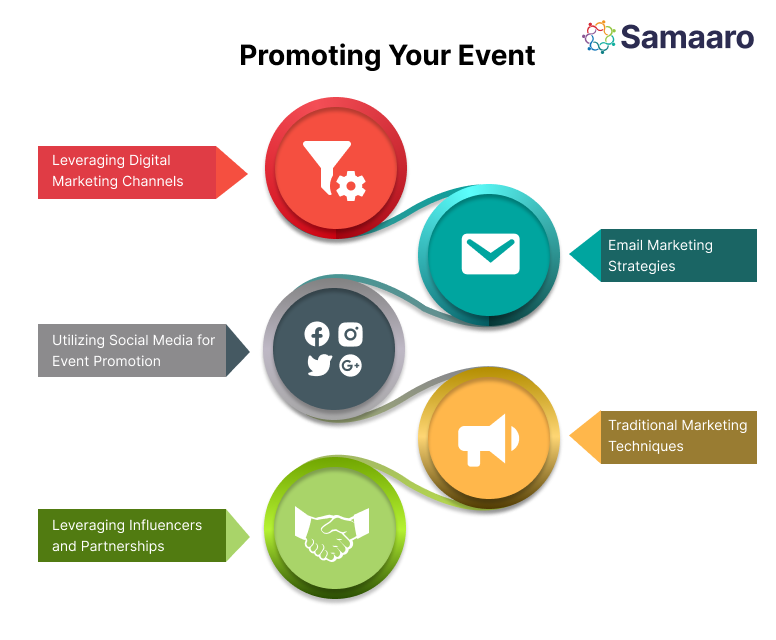
After you have a plan in place, it’s time to effectively market your event. We’ll look at many marketing avenues and strategies in this chapter to make sure the correct people learn about your event.
Leveraging Digital Marketing Channels
When it comes to promoting events, digital marketing is essential. As the person planning the event, you ought to maximize your internet visibility. Make sure your website has all the information people need to know about your event, such as the schedule, speakers, and registration information. Use SEO (Search Engine Optimization) to increase the online visibility of your event. To promote your event on websites like YouTube, think about making interesting videos and using online advertising to attract a wider audience.
Utilizing Social Media for Event Promotion
Social networking sites are becoming priceless tools for promoting events. You can use Facebook, X (Twitter), LinkedIn, Instagram, and other networks to efficiently promote your event as an organizer. Create material that is interesting to share. To foster a feeling of community and inspire participants to share their joy, use hashtags unique to the event. Provide teases, behind-the-scenes photos, and suspenseful narratives.
LinkedIn can be utilized, for instance, to establish connections with tech industry people and disseminate information about your upcoming technology conference. You can use visually appealing images and stories on social media sites like Instagram to highlight the venue, speakers, and general atmosphere of your event.
Email Marketing Strategies
Email marketing is still a very effective way to advertise events. You may reach potential attendees by creating efficient email marketing as an event organizer. To spark attention, begin with customized invites. As the date of the event draws near, send out reminders. Provide all pertinent information in your emails, including links for registration, speaker bios, and the agenda. To incentivize recipients, you can also provide exclusive discounts or incentives for early bird registration.
Traditional Marketing Techniques
Don’t undervalue the effectiveness of conventional marketing techniques, even though digital marketing is crucial. As an event planner, you ought to think about combining offline tactics with your online ones. Creating and distributing printed items like flyers, posters, and brochures may fall under this category. Attendees frequently value reusable, visually appealing marketing materials that they can handle and consult. Furthermore, if traditional media channels still resonate with your target audience, don’t discount them as a means of targeting specific demographics. Examples of these channels are newspapers and radio.
Leveraging Influencers and Partnerships
Working together may change the game when it comes to promoting events. To increase the reach of your event, as an organizer1, think about finding and collaborating with strategic partners and influencers. Working together with influencers in your field can help you reach out to their current fan base, which will increase the visibility of your event and give you credibility. Similarly, collaborating with like-minded companies or groups can lead to joint marketing and resource sharing.
For instance, you may collaborate with nearby eateries, food bloggers, and culinary influencers if you’re planning a food and drink festival. Their participation and endorsements can greatly increase the legitimacy and audience for your event.
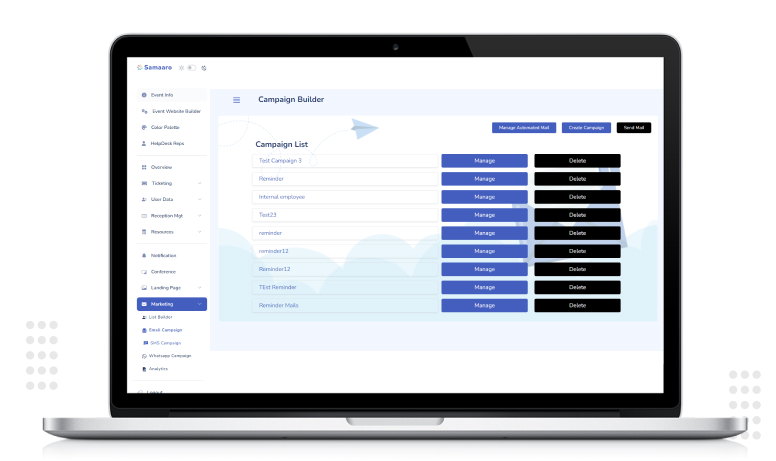
List Building
Collect and store data on all potential and past event attendees in a single location. This includes details like names, contact information, preferences, and attendance history. Successful event marketing hinges on effective audience targeting. In the digital age, having a well-organized list of potential and past attendees is invaluable. An event marketing dashboard simplifies the process of list building by offering a centralized repository for all your audience data.
Audience Segmentation
Once you’ve built your list, the next step is to segment your audience effectively. Audience segmentation involves categorizing your contacts into distinct groups based on specific criteria. This allows you to send personalized and highly relevant messages to different segments of your audience. Segment your audience by engagement levels, distinguishing between highly engaged, moderately engaged, and less engaged individuals. This helps in creating targeted re-engagement campaigns. Different segments of your audience may have varying interests and preferences.
Targeted Marketing Campaigns
Using audience segmentation, you can send content that caters specifically to each segment. For instance, you can send detailed technical content to the segment of your audience interested in technical aspects, while providing high-level overviews to those who prefer a broader perspective. Beyond improving your targeting and engagement, list building and audience segmentation offer a wealth of data-driven insights. By analyzing the performance of each segment, you can refine your marketing strategies, track attendee behavior, and make informed decisions for future events.
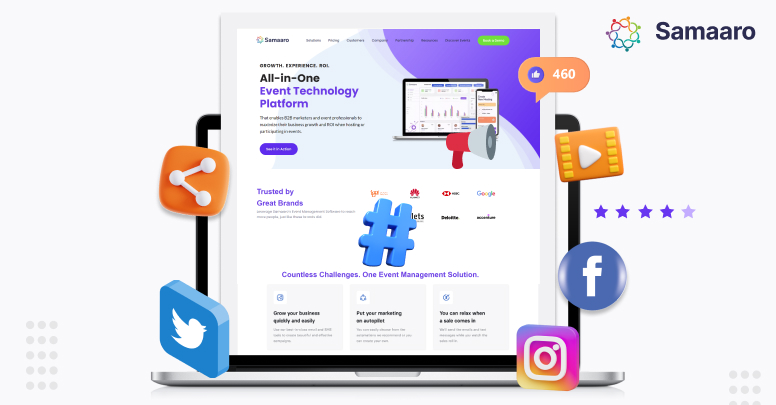
Integration
Thematic Event Website Builder: Samaaro’s thematic event website builder is a powerful tool that allows you to create stunning and highly customizable event websites. It offers features like drag-and-drop design, pre-designed templates, and real-time updates. This enables you to effortlessly craft an engaging online presence for your event, complete with branding and content customization.
Email Campaigns: Samaaro simplifies event promotion with its email campaign capabilities. You can seamlessly create and manage email campaigns, reaching out to your target audience with event updates, reminders, and important information. The platform provides analytics to track the success of your campaigns, ensuring efficient communication.
Push Notifications: Samaaro’s push notification feature is an asset for event organizers. It allows you to send real-time updates, announcements, and reminders directly to attendees’ devices. This instant and direct communication channel enhances attendee engagement and ensures that they stay informed throughout the event.
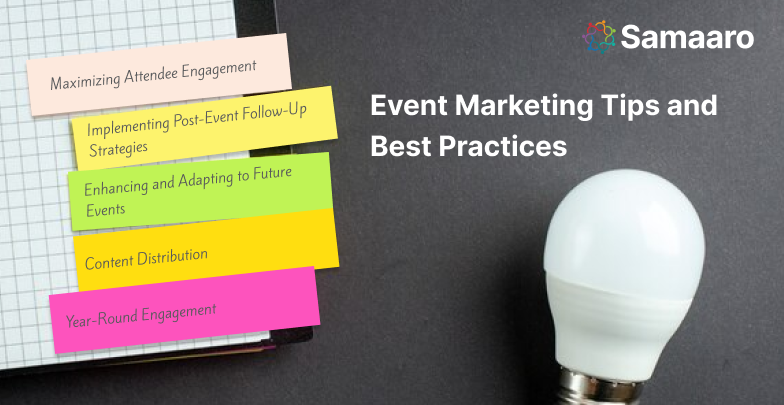
As an event organizer, now that you have mastered the fundamentals, it is time to investigate advanced strategies and best practices that will increase the effectiveness of your event marketing efforts.
Maximizing Attendee Engagement
Attendee engagement is critical to the success of your event as an event organizer. There is a greater likelihood that engaged attendees will retain the information presented at the event and create lasting memories of their experience. To optimize user involvement, take into account the subsequent tactics:
Implementing Post-Event Follow-Up Strategies
When the event concludes, it is not over. Post-event follow-up is of the utmost importance for event organizers to preserve relationships and guarantee a lasting impression. Execute the subsequent strategies:
Enhancing and Adapting to Future Events
It is crucial for event organizers to consistently modify and enhance their event marketing strategies. The following are several critical domains to concentrate on:

The success of your event goes beyond the applause on the day; it’s about achieving your goals and proving a return on investment. As an event organizer, it’s crucial to measure the impact of your efforts.
Defining Key Performance Indicators (KPIs)
The Key Performance Indicators (KPIs) that are most pertinent to your event and business goals should be defined by you as the event organizer. KPIs are measurable indicators that assist you in determining the event’s success. For event marketing, event technology platforms like Samaaro come into the picture that can provide a lot of data and analytics to make the upcoming events better by analyzing this data.
Collecting and Analyzing Data
When evaluating the success of your event, data is an event planner’s best friend. Gather information from a range of sources, including survey questions conducted on-site, registration forms, social media analytics, and ticket sales platforms. Gain useful insights into the behavior, preferences, and demographics of attendees by analyzing this data.
Track attendance, session popularity, and engagement levels with event management software. Track social media data to gauge the online attitude and reach of your event. You can modify your marketing and event plan for upcoming events by examining this data.
The Importance of Attendee Feedback
Attendee input is very valuable. Gathering input from attendees can help you as the event planner identify what went well and what needs to be improved. Give participants a chance to voice their thoughts by using surveys or assessments conducted after the event. Aspects such as the overall experience, event organization, and topic relevancy should be covered in the questions.
Additionally, think about holding interactive exercises that promote real-time feedback or in-event feedback sessions. Feedback from attendees not only demonstrates your appreciation for their opinions but also helps you improve future events.
Monitoring ROI (return on investment)
As an event organizer, return on investment (ROI) is a crucial indicator for evaluating the event’s financial impact. Compute the return on investment (ROI) by contrasting the total revenue of the event—which includes ticket sales and any sales made on-site—with the total expenses—which include personnel costs, venue rental, marketing, and other expenses. A high return on investment (ROI) suggests that your event was profitable.
In the world of event marketing, success is not measured by the number of attendees alone. It’s about creating memorable experiences, fostering meaningful connections, and achieving your strategic goals. As an event organizer, you have the power to leverage event marketing to enhance your brand’s visibility, build a community, and drive success like never before.
Experience Samaaro and unleash the power of automated event marketing, start your free trial today!
Picture this – a room buzzing with excitement, a sea of faces eager to immerse themselves in a grand event. For event organizers, this is a dream come true, but what if you could unlock the secrets hidden within those attendees? Well, the key lies in event check-in data.
Did you know that event check-in data is the hidden treasure chest for event organizers? It holds the potential to unveil a wealth of insights that can transform an ordinary event into an extraordinary one. In the world of event planning, where every detail matters, data collection and analytics in event check-in is nothing short of a game-changer.
Let’s dive deep into the nuances of data collection and analytics in event check-in. This data is invaluable in helping organizers create personalized experiences, optimize event logistics, and forecast trends. It’s time to unlock the potential of this data and harness its power for the benefit of event organizers and attendees alike.
Traditionally, the main objective of event check-in has been to effectively oversee attendance. It ensured that the right people were present at the right time. However, as technology and audience expectations have advanced, new possibilities have emerged.
The function of check-in data has significantly broadened in scope from mere headcount. Presently, it serves as a critical component in presenting insights that extend beyond the realm of attendance monitoring. The need for a more individualized, data-centric approach to event coordination is the driving force behind this shift.
Attendee information: Organizers collect basic participant details, including names, contact information, and registration details, during the check-in process. This information serves as the basis for subsequent analysis.
Barcode or QR code scanning: The implementation of badges or QR codes simplifies the process of monitoring session attendance. Organizers are now able to determine the most popular sessions and make necessary schedule adjustments.
Geolocation data: Event organizers can track the movements of attendees within the venue using geolocation data. This data is of the utmost importance in determining which kiosks or areas are attracting the most interest.
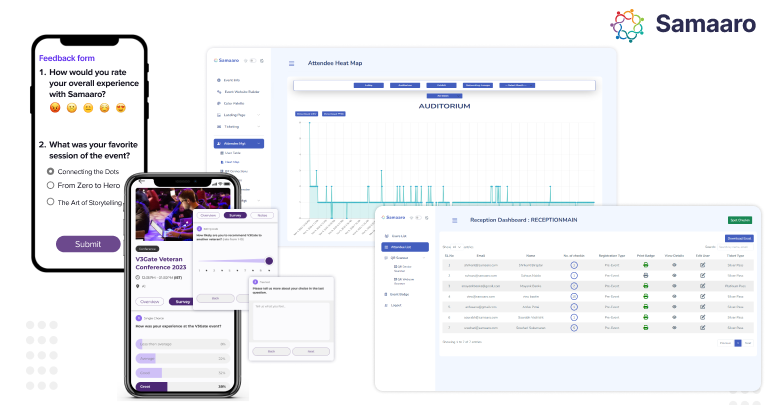
Understanding Attendee Behavior
Patterns of attendance at sessions: The analysis of check-in data can provide insights into the sessions that draw the largest number of attendees. This data can provide organizers with guidance regarding content creation and scheduling.
Areas or booths that attract the most attention: Organizers can determine which areas or kiosks generate the most interest by monitoring where attendees spend their time. This information is invaluable to sponsors and exhibitors.
Trends in social interaction and networking geographical information can be determined with the aid of geolocation data analysis. By utilizing this information, networking opportunities can be enhanced.
Personalization and Engagement
Tailoring event content: By leveraging information gathered from check-in records, event organizers can customize event content to align with the interests of attendees. This customization improves the experience of the attendees.
Utilizing check-in information, event applications can increase attendee engagement by transmitting personalized notifications, event recommendations, and updates.
Enhancing the Logistics of the Event
Organizers can ensure that all attendees have a safe and pleasurable experience by managing event capacity in real-time using data on attendee movements.
Organizers can optimize traffic flow by determining where attendees are going, thereby reducing congestion and improving the overall experience of the event.
By identifying constraints in the event layout or schedule, check-in data enables organizers to promptly resolve any issues that may arise.
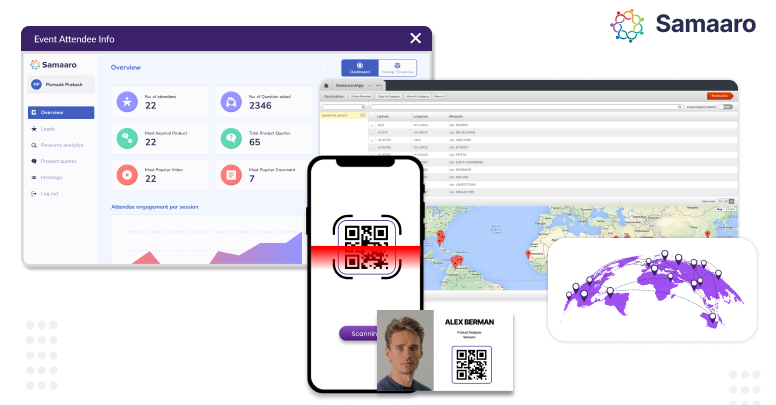
Track Session Attendance:
Utilize session tracking features to see which sessions most popular and which speakers are most engaging. This data can inform your future event programming.
Leverage Mobile Apps:
Event technology platforms, like Samaaro often include mobile apps for attendees. These apps can collect data on which sessions attendees visit, their interactions, and even real-time feedback. Analyze this data for insights into attendee behavior.
Real-Time Analytics:
Access real-time analytics dashboards within your event technology platform to monitor attendee activity, ticket sales, and other key metrics throughout the event.
Integrate with CRM and Marketing Tools:
Ensure your event technology platform integrates with your CRM and marketing tools to centralize and analyze data across various systems, helping you gain a holistic view of your attendees.
Monitor Social Media Activity:
Many event platforms offer social media integration. Monitor hashtags and mentions to gauge social media activity surrounding your event. This can provide insights into attendee sentiment and engagement.
Data Security and Compliance:
Be mindful of data security and privacy regulations. Ensure that your event technology platform complies with data protection laws and that you have consent to collect and use attendee data.
Implement Surveys and Feedback Forms:
Use built-in survey tools in your event technology platform to gather feedback from attendees during and after the event. Ask about their experience, satisfaction, and suggestions for improvement.
As we wrap up this exploration, it’s clear that check-in data is more than just numbers on a spreadsheet. It’s the key to creating memorable, personalized, and efficient events that leave attendees wanting more. In this age of data-driven decisions, event organizers who master the art of using check-in data stand to gain a competitive edge, and attendees can look forward to events that exceed their expectations. With Samaaro’s Event technology transform your events and reach new heights of success. Start your free trial now!
As the event industry continues to evolve, measuring Event ROI has become a transformative practice that influences the future of event planning and marketing. In today’s data-driven environment, measuring the success of events has never been more important. This introduction examines the evolving event industry landscape and the impact of ROI measurement.
In recent years, the event industry has witnessed a significant transformation. Events have evolved from one-time gatherings to a strategic marketing channel that fosters engagement, cultivates brand loyalty, and generates significant revenue. Nonetheless, this transformation is accompanied by higher expectations, increased competition, and a heightened emphasis on quantifying the impact of every event.
This article will delve deeper into the strategies and metrics that can assist you in navigating this ever-changing landscape, optimizing your event planning and efforts, and ultimately generating substantial returns on your event investments. Let’s examine the process of ROI measurement throughout the event lifecycle and reveal the tools and techniques that contemporary event professionals use to achieve success.
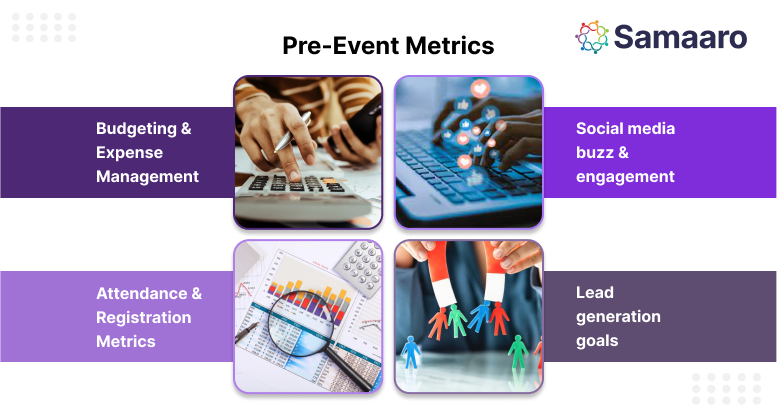
Several vital statistics should be tracked prior to the start of your event to ensure a successful ROI measurement.
Budgeting and Expense Management
Budgeting is one of the initial stages in planning an event. Budget tracking and management are fundamental to measuring ROI. Start by defining your budget, categorizing it, and closely monitoring your expenses. This enables you to maintain financial discipline and more efficiently allocate resources.
Attendance and Registration Metrics
Keeping a close watch on the number of registrations and anticipated attendance is a fundamental pre-event metric. This information can help you determine whether or not your marketing efforts are effective. Compare the number of registrations to your objectives and adjust your marketing strategy accordingly.
Social media buzz and engagement
In today’s digital era, social media proves essential for generating discussion and interest in your event. Tracking key social media metrics, such as likes, shares, comments, post impressions, and the number of new followers, enables you to determine the level of anticipation and enthusiasm surrounding your event.
Lead generation goals
Typically, lead generation is the primary objective of events. Establish measurable objectives for lead generation and metrics to track them. The number of prospects generated prior to the event can be a useful indicator of the potential impact of the event on your sales pipeline.
Once your event has begun, you should concentrate on metrics that provide insight into the live experience and participant engagement.
Attendee Engagement
During the event, it is essential to measure the engagement of attendees. This is measured by session attendance, workshop or interactive activity participation, and networking activity. By analyzing these metrics, you can determine the level of interest and participation generated by your event among attendees.
Audience Feedback & Surveys
Obtaining feedback and opinions from event attendees can provide insightful information. Real-time surveys can help you identify areas for enhancement and make immediate adjustments to improve the event experience.
Real time social media monitoring
Monitoring social media during the event is crucial for assessing real-time reactions, sentiment, and the event’ s overall impact. Responding to issues and trends as they emerge can assist in the management of negative publicity and the reinforcement of positive experiences.
Technology and tools for data collection
During an event, modern event management technology can expedite data collection. Using event management platforms such as Samaaro can significantly improve your ability to capture and analyze data in real time.
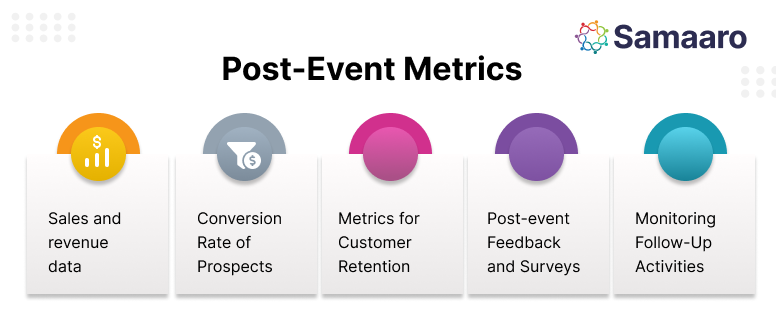
In the post-event phase, you can analyze the event’s ultimate impact and evaluate its ROI.
Sales and revenue data
Analyse revenue and sales information to determine the event’s financial viability. This includes ticket sales, merchandise sales, and expenditures made after the event.
Conversion Rate of Prospects
The lead conversion rate indicates the proportion of event prospects that converted into actual customers. It is a crucial metric, particularly if one of your primary objectives was lead generation. Divide the number of converted leads by the total number of leads generated to determine this rate.
Metrics for Customer Retention
Not only do successful events attract new consumers, but they also retain existing ones. After the event, monitor customer retention by monitoring repeat attendance or increased engagement with your brand or products.
Post-event Feedback and Surveys
Post-event surveys and feedback are necessary for amassing comprehensive information about attendees’ overall satisfaction and identifying areas for improvement.
Monitoring Follow-Up Activities
Frequently, the success of an event depends on what occurs after the event. Follow-up actions, such as scheduled sales meetings, product demonstrations, and additional lead cultivation efforts, should be monitored and evaluated.
Samaaro, a robust platform for event administration, provides a variety of tools to simplify the process of calculating Event ROI. It streamlines data collection, analysis, and reporting by integrating CRM, marketing tools, and analytics, making it simpler for event organizers to gain insights and optimize future events.
Samaaro’s lead tracking features enable you to monitor and manage leads efficiently, from initial contact to post-event follow-ups. It helps you create a holistic view of your attendees and their journey, making it simpler for your sales team to priorities the most promising leads.
In addition, Samaaro’s marketing tools enable communication with event attendees before, during, and after the event. Automated email campaigns, social media integration, and personalized messaging can all enhance the effectiveness and engagement of an event.
Samaaro’s analytical insights are indispensable for event organizers. Real-time reporting and data visualization allow you to monitor the progress of the event and evaluate the success of various sessions, activities, and marketing strategies in real- time. By accessing real-time data, you can rapidly adapt and improve the experience of your attendees.
Event organizers and marketers are required to calculate event ROI. By paying close attention to pre-event, during-event, and post-event metrics and utilizing event technology such as Samaaro, you can maximize event ROI, the success of your events, enhance your strategies, and guarantee a positive impact on your organization’s bottom line.
The Future of Event ticketing is here, and it’s set to revolutionize the way we attend and engage with events. In this blog, we’ll explore the evolution of event ticketing, from its current challenges to what the future holds!
Whether it’s a music concert, a sporting event, a theatre production, or a conference, event ticketing plays a crucial role in molding our event-going experiences. In its purest form, event ticketing is the process of selling tickets to events. These permits grant access to a variety of entertainment options, including music festivals, sporting events, cultural exhibitions, and conferences. Purchasing a ticket may seem mundane, but it has a significant impact on our leisure activities.
Ticketing is a journey that transcends time and space. From the days of physical tickets, where you held a tangible piece of enthusiasm in your hand, to the digital age, where event registration and ticketing platforms such as Samaaro have opened up new horizons, this story is a testament to human creativity. It is a story of convenience, accessibility, and the unrelenting pursuit of fulfilling your entertainment desires.
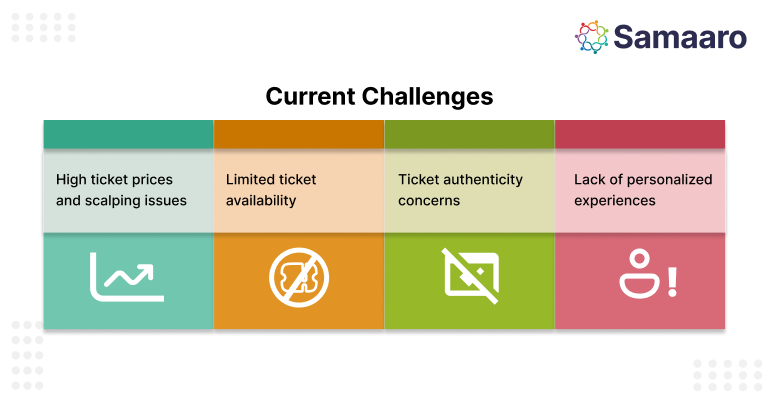
High Ticket Prices and Scalping Issues
One of the most significant obstacles in the world of event ticketing is the escalating price of tickets, which is partially caused by scalping – the resale of tickets at exorbitant prices. This can make it prohibitive for many enthusiasts to attend events.
Limited Ticket Availability
Tickets for popular events frequently sell out quickly, leaving many admirers empty-handed. This restricted supply exacerbates the problem of skimming.
Ticket Authenticity Concerns
Unsuspecting purchasers continue to fall victim to scams involving counterfeit tickets, adding a layer of mistrust to the ticketing process.
Lack of Personalized Experiences
The ticketing process is often impersonal, lacking tailored recommendations or options that match individual preferences.
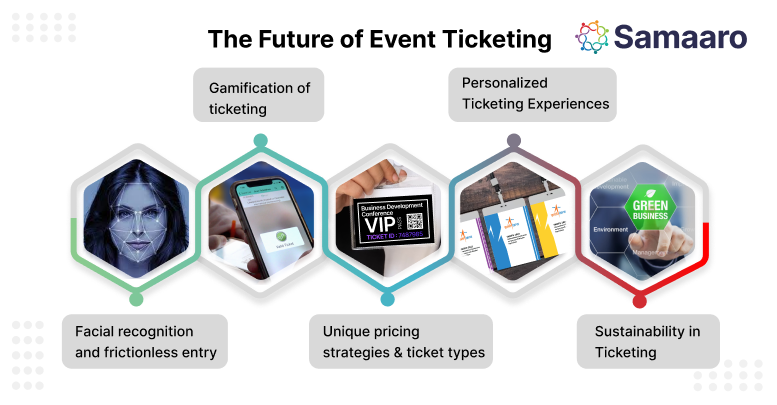
In the event ticketing industry, facial recognition technology is poised to become a game-changer. This innovation will enable attendees to enter venues efficiently and securely. Here is how it operates:
Biometric Data: Attendees will register their facial biometric data with event organizers during the ticket purchase procedure or via a specialized app. This information is encrypted and stored securely, assuring confidentiality and compliance with data protection regulations.
Frictionless entry: On the day of the event, attendees merely approach the entrance and walk in. Cameras equipped with facial recognition technology will rapidly scan their features, confirming their identity and the validity of their tickets in an instant. This eliminates the requirement for paper tickets and even mobile QR codes.
Enhanced Security: Facial recognition significantly reduces the risk of ticket forgery and scalping, thereby enhancing security. Only those with genuine tickets and matching facial data will be permitted entry, creating a safer environment for all attendees.
Efficiency: The procedure is extraordinarily efficient, decreasing wait times and congestion at entry points. This is especially advantageous for large events, where lengthy lines and delays can be a significant inconvenience.
The gamification of ticketing transforms the process of purchasing tickets into an interactive and engaging experience. Here’s how it may function:
Ticket Challenges: Event organizers are able to design ticket-related challenges and games. For example, supporters may receive points, badges, or virtual items for purchasing tickets in advance or for attending multiple events during a season.
Exclusive Rewards: Gamified ticketing can offer exclusive rewards such as backstage passes, artist meet-and-greets, and VIP lounge access. These rewards can be earned via gameplay or loyalty programmes linked to the purchase of tickets.
The one-size-fits-all pricing model will no longer be used in the future of event ticketing. Rather, event organizers will employ dynamic pricing and offer a range of ticket types to accommodate a variety of budgets and preferences:
Dynamic Pricing: Prices may vary based on variables such as demand, time of purchase, and seat location. The prevalence of early bird discounts, last-minute bargains, and off-peak pricing will make events more affordable for various groups of attendees.
Wide-ranging Ticket categories: Event organizers will offer various ticket categories, each with its own benefits and experiences. For example, a music concert may offer standard, VIP, and Platinum options, each of which provides distinct benefits such as seating, access to exclusive areas, and merchandise bundles.
Bundled Experiences: Organizers will bundle tickets with other experiences, such as pre-show dinners, merchandise, or even transportation, in order to offer attendees a complete, hassle-free event package.
AI-powered algorithms will play a crucial role in the development of personalized ticketing experiences:
Recommendations: These algorithms will analyze user data, such as previous event attendance, musical preferences, and location, to provide customized event recommendations. Users will receive notifications regarding events that align with their interests, thereby increasing the likelihood that they will attend.
Attendees will be provided with seating suggestions based on their preferences. Those who prefer a subdued experience, for instance, may be directed to sections further from the stage but with superior acoustics.
Customized Event Add-Ons: Systems can also recommend event add-ons, such as VIP packages, merchandise, and in-event experiences, that correspond to a user’s profile and preferences.
The future of event ticketing will align with sustainability objectives:
E-Tickets: Traditional paper tickets will be phased out in favor of mobile permits and e-tickets. These digital options reduce the amount of paper waste and carbon emissions caused by the printing and distribution of tickets
Green Venues: Venues for events will implement sustainable practices, such as energy-efficient lighting, renewable energy sources, reduced plastic usage, and waste recycling programmes. This commitment to sustainability will resonate with attendees who are environmentally conscious.
Transportation Options: Ticketing platforms may partner with eco-friendly transportation services to provide attendees with information on public transportation or carpooling options to reduce the carbon footprint associated with attending events.

The future of event ticketing is poised to revolutionize the way we access and experience events. From eliminating scalping and fraud to enhancing accessibility and personalization, this industry is on the brink of exciting transformations. As technology continues to advance, event ticketing will evolve, ensuring that more people can enjoy the magic of live events. So, whether you’re a die-hard sports fan or a music enthusiast, the future of event ticketing promises to make your experiences more memorable, accessible, and enjoyable than ever before.
An event’s first impression is generally formed during the registration and badge printing process. POS machines have revolutionized both the registration and badge printing processes, making events easier for organizers and attendees alike. In this article, we’ll look at three ways a point-of-sale system may streamline the registration and badge printing process for your event: On-the-spot email check-in, QR code check-in, and registration. With Samaaro you can now transform your events, keep reading to find out how.
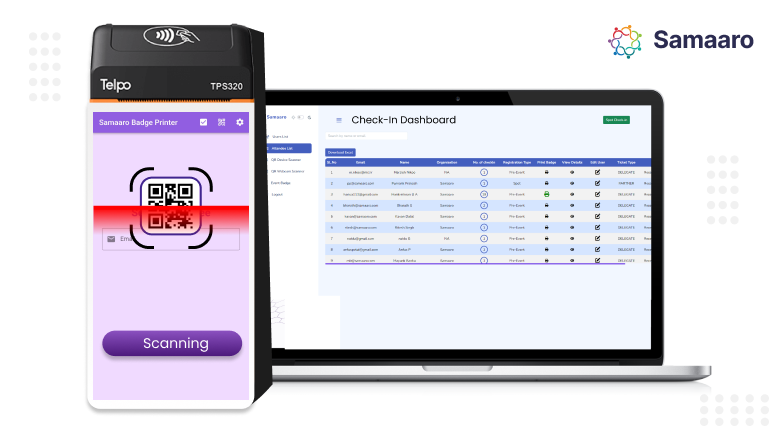
With their widespread use in modern technology, QR codes are ideally suited for event registration. Here’s how QR codes and point-of-sale devices facilitate on-spot check-in:
Pre-registration: Attendees pre-register online and are sent a confirmation email containing a unique QR code, much like the email-based system.
Integration with Point-of-Sale Machines: QR code scanner-equipped POS machines are stationed at check-in desks and other access points.
Effortless Check-In: guests scan their QR code at the point-of-sale terminal using either their mobile device or a printed hard copy. Within seconds, the system will confirm their registration and give a badge.
Benefits
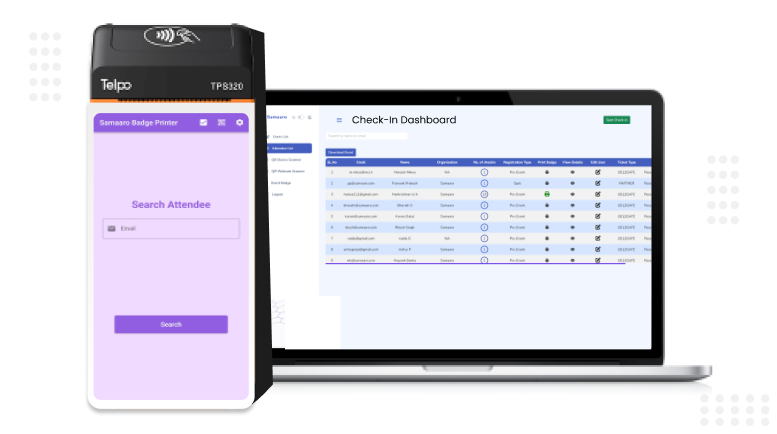
Spot check-in through email is one of the most practical ways to speed up event registration and badge printing. This is how it functions:
Pre-registration: Attendees must register for the event in advance online, providing their contact information, event preferences, and any other relevant details.
Event Check-In: On the day of the event, attendees arrive at the check-in counter. Instead of presenting a physical ticket or QR code, they simply provide their registered email address to the event staff.
Email Verification: The event staff enters the attendee’s email address into a point-of-sale (POS) machine or check-in system. The system then verifies the email address against the registration database.
Badge Printing: Once the email address is verified, the POS machine prints a badge or ticket for the attendee, granting them access to the event.
Benefits:
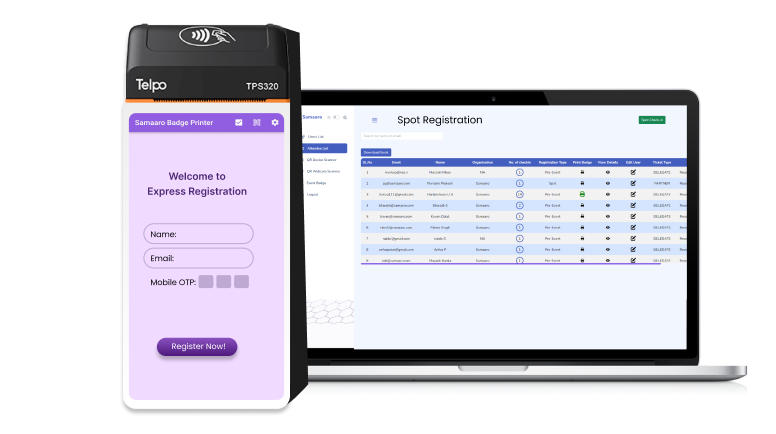
On-the-spot registration is a must-have for events when people decide to arrive at the last minute. Point-of-sale terminals can greatly facilitate this:
On-Site Registration: To ease on-the-spot registration, event organizers will have point-of-sale devices available at the location.
Data Entry: Customers give their information to the staff who enter it into a point-of-sale terminal. Name, contact information, and preferences can all be part of this.
Badge Printing: The POS machine prints out a badge for each guest after their information is entered.
Benefits:
In conclusion, POS machines may dramatically improve the registration and badge printing phases of event administration. The advantages of on-the-spot registration, whether through email, QR codes, or manual check-in, are clear: increased efficiency, more accuracy, and a more positive experience for everyone involved. Samaaro is the future of event management, start your free trial now!
In today’s fast-paced business world, efficient and effective networking is essential for success.
Whether you’re orchestrating a conference, trade show, or corporate gathering, making sure the correct individuals connect can be a game-changer. This is where Samaaro’s innovative pre-meeting scheduler comes into play. What distinguishes us? Our revolutionary pre-meeting scheduler simplifies and elevates the entire networking experience, changing the game. This innovative tool revolutionizes our approach to event planning and networking by providing a more effective and time-saving method for scheduling meetings, which benefits everyone.
Customized Meeting Planning Software from Samaaro includes automated agenda scheduling, reminder and notification systems, and seamless integrations with your preferred scheduling platform, among other features. Explore the platform’s offerings and observe how it can accelerate your event networking experience with ease. Let us lead you on a journey that will make your event networking as effortless as a light breeze.
As you’ve come to understand, meetings play a vital role in organizing events. These meetings serve various purposes, whether they involve speakers and attendees, solution providers and attendees, or individuals participating in workshops. To simplify matters, we’ll refer to these groups as “attendees” and “solution providers” throughout this blog.
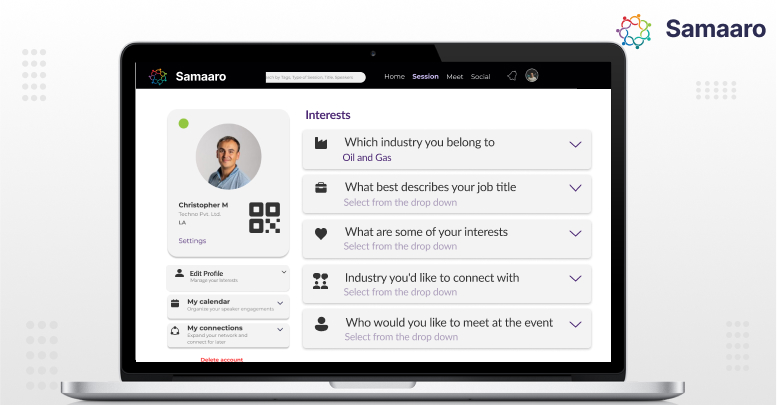
You begin by registering the users who will be attending the event. In this section, the attendees are prompted to provide additional information, including their interests, preferences, and objectives for the event. This data is useful for creating more meaningful connections during the process of matchmaking.
Similarly, the registration process for sponsors and solution providers is comprehensive. They must submit specific information about their offerings, industry, and event objectives. This data will be used to match them with attendees who are interested in their products or services.
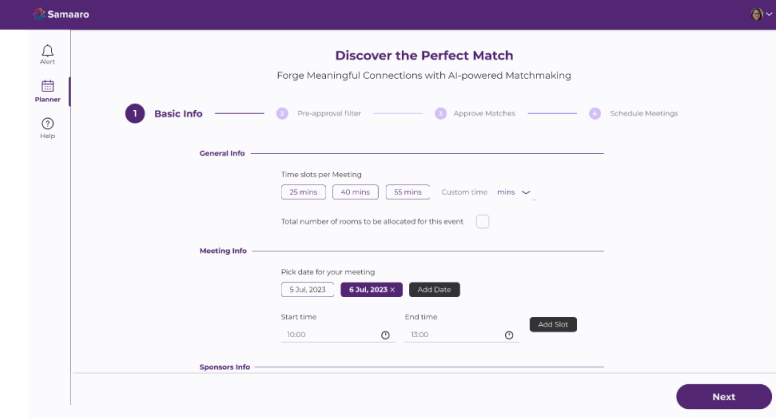
Once users and solution providers are registered, event organizers gain access to the Meeting Planner Dashboard. This dashboard provides an overview of key metrics and settings:
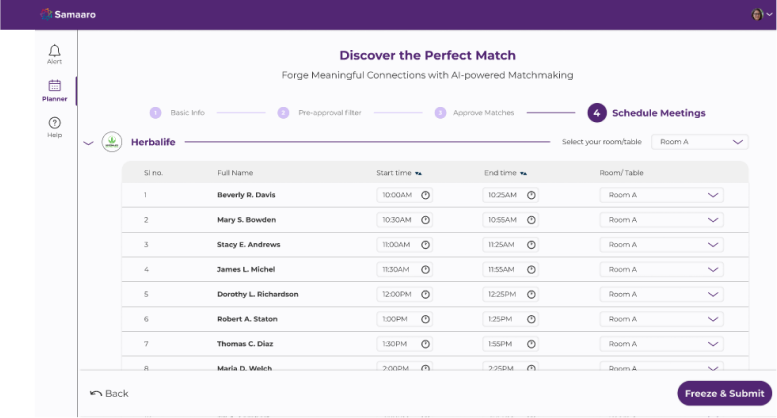
This portal facilitates meaningful interactions and partnerships between event attendees and service providers (SPs).
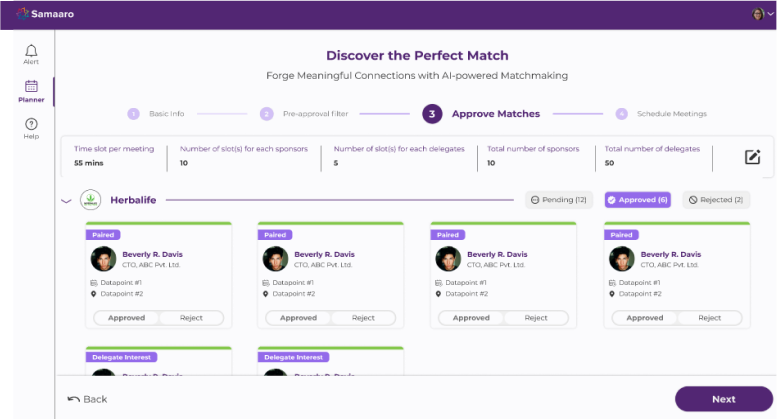
As the event organizer, you play an integral part in optimizing and aligning the matchmaking process with the event’s goals. You are responsible for ensuring that the meetings we scheduled are productive, making any necessary adjustments, and enhancing the experience by sending out reminders prior to the meeting.
Using Samaaro’s Custom Meeting Planning Software, event organizers can create a networking environment that is efficient, productive, and tailored to their event’s objectives. The comprehensive features of the software and the role of the organizer in assessing, revising, and facilitating connections make it an invaluable tool for event planning and networking success. Say goodbye to the complexities of manual matchmaking and welcome to a simplified, technology-driven approach that increases the value of each meeting at your event. Experience Samaaro: start free your trial today!
B2B events are not merely gatherings; they are strategic initiatives that can generate significant returns for your organisation. They allow your brand to flourish, your experts to astound, and your audience to connect more closely. In the realm of business-to-business (B2B) events, where competition is fierce, success is no easy feat.
These events are essential for networking, the exchange of information, and brand promotion. The formula for success remains the same whether you are organising a trade exhibition, conference, or seminar. In this comprehensive blog, we will examine key strategies and tactics that will elevate your B2B event to new heights.

The first & foremost, your event’s brand identity sets the stage for everything that follows. It not only attracts attendees but also establishes your event as a must-attend in the industry.
A sense of exclusivity can generate anticipation and enthusiasm for your event. Consider offering limited invitations, VIP sessions, or early access to valuable content to key industry participants. This exclusivity will make the delegates feel privileged and strengthen their desire to attend.
The speakers you choose can make or break your event’s credibility. Choose thought leaders, industry experts, and influencers who can provide insightful commentary and captivate your audience. Carefully curate your speaker roster to include a variety of pertinent topics and perspectives.
Choose sponsors and solution providers whose objectives and interests align with those of your event. Collaborate with organisations that can sincerely enhance the experience of your attendees. Avoid saturating your event with too many sponsors, as this can dilute the event’s message and detract from its focus.

Once you’ve established a strong brand foundation, it’s time to spread the word about your B2B event. Effective event marketing is essential to attract attendees, 31% of marketers say event marketing is the most effective tool they have.
Utilise email marketing to its maximum capacity. Regularly spread newsletters with updates, sneak glimpses, and relevant industry news. Share past event successes to demonstrate the value attendees can anticipate. Different segments of your intended audience will be reached via email.
Utilise social media platforms to establish your event as an industry thought leader. Share informative content, industry trends, and participate in audience discussions. Create hashtags specific to your event and encourage attendees to use them to generate online chatter.

To ensure the success of your B2B event, you need the right tools and strategies in place. These tools can enhance the attendee experience and simplify event management.
Essential for monitoring attendee numbers, managing guest lists, and planning logistics is a user-friendly RSVP system. Ensure that your RSVP process is simple, mobile-friendly, and accommodating of last-minute changes.
A mobile app for an event can enhance the experience for attendees. It can provide comprehensive event schedules, speaker biographies, interactive maps, and real-time updates. Encourage attendees to acquire and utilise the app for convenient event information access.
Facilitate networking by incorporating a pre-meeting scheduler into your event application. This feature enables attendees to schedule one-on-one meetings with speakers, sponsors, and other attendees prior to the event. It increases attendee participation and facilitates valuable connections.
Streamline speaker management with specialised software that facilitates the organisation of their schedules, presentations, and communications. Provide a platform for presenters to upload their presentations in advance, thereby facilitating seamless transitions between sessions.

Creating a FOMO before the event begins can swiftly boost registrations. Engaging with the audience is the key here. Try creating a sense of them missing out on a lot if they don’t attend. Wondering how? Keep reading.
Before the event, organise webinars or Q&A sessions with essential speakers. This not only generates excitement but also allows attendees to interact with lecturers and get a taste of what lies ahead.
Offer early registration incentives such as discounted ticket prices, exclusive access to content, and limited-edition event merchandise. Not only does early registration increase attendance, but it also provides valuable information about expected numbers.
Provide attendees with sneak peeks of the event’s offerings. Share brief video clips of presenters delivering insightful remarks or showcasing the event’s venue. Create anticipation and intrigue.
Keep in mind that success will be measured by how much of an impact your event had on participants long after it was over. You could organise a groundbreaking event by emphasising brand development, strategic event marketing, the use of appropriate technology, and early participant involvement. The success of a business-to-business media event is measured not just by the immediate results it produces, but also by the long-term effects it has on your attendees, speakers, sponsors, and the field. Use these suggestions to create a B2B media event that will set you apart from the competition. Experience Samaaro: start your free trial today!
In the fast-paced world of event management, the importance of technology has become indispensable. Event Management Software (EMS) platforms have emerged as game-changing innovations, providing event organisers with a multiplicity of benefits.
Revenue-wise, the global Event Management Software Market was valued at approximately $7 billion in 2021 and is projected to surpass $14.1 billion by the end of 2026, expanding at a CAGR of 14.9%. Software platforms for event administration have revolutionised the planning, execution, and experience of events.
They have surpassed conventional methods by providing an assortment of advantages that expedite the entire event lifecycle. These platforms are more than mere tools; they are strategic assets that enable event organisers to produce memorable and productive events.
Samaaro stands out among the many available EMS platforms as a comprehensive solution that meets a variety of event requirements. In this article, we will examine the nine essential features that make Samaaro an indispensable tool for event organizers.
Before we delve into these features, let’s discuss some essential considerations for selecting an event management software platform.
Choosing the appropriate EMS platform is a crucial decision that can have a substantial effect on the success of your event. Here are some important factors to consider:
Scalability: Ensure that the platform can scale to accommodate the size and complexity of your event.
User-friendliness: The software should be user-friendly for both event organisers and attendees.
Customization: Look for a platform that allows you to tailor the event experience to your specific requirements.
Data Security: Data security should be a top priority to safeguard sensitive information.
Integration: Ensure that the platform can integrate seamlessly with other tools, such as CRM software or marketing tools, that you may be using.
Now, let’s explore the nine essential features that Samaaro provides:

This ticketing feature enables event organisers to design enticing offers, such as group discounts and special promotions. This feature not only attracts a larger audience, but also boosts ticket sales. Event organisers can create a variety of promotions, discount codes, and tiered pricing structures to accommodate the preferences and budgets of their attendees. The ultimate result is a flexible ticketing system that both encourages more people to come and gives them the most for their money.
As the world becomes more interconnected, it is no longer exceptional for events to draw guests from all over the globe. Samaaro streamlines this procedure by letting event planners list tickets in many currencies at once. It’s great to know that attendees from all over the world won’t have to worry about currency conversion when buying tickets. It improves usability, making purchasing tickets easier for a wider range of people.
The ability to tailor access control is critical for managing a wide range of event attendees. You can set up different levels of access for different types of tickets via Samaaro. For example – the auditorium is accessible to those with silver passes, while the exhibition hall is open only to those with gold passes. Having this kind of oversight improves both the security and ease of the event for everyone involved.
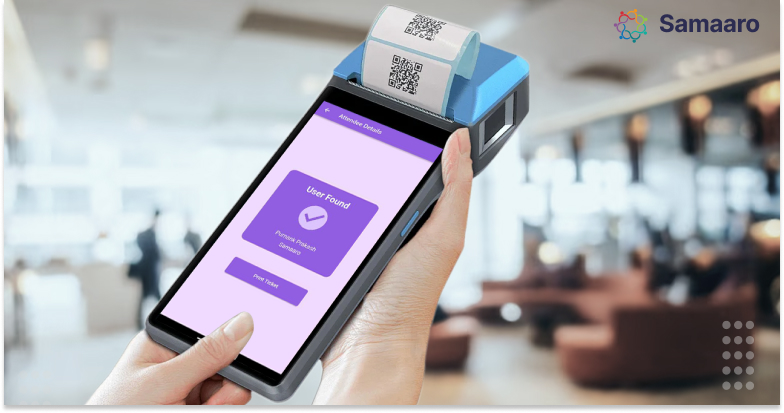
Samaaro’s revolutionary new POS machine will change the way people sign up for events. This flexible tool facilitates quick and simple on-the-spot check-ins via email and QR codes. Not just that, but if anyone has missed signing up for the event, it also allows to quickly register them on spot. It lessens the inconvenience of having to wait in queue, does away with human labour, and improves the event for everyone involved. By streamlining the registration process, this technology can help your events succeed.
Samaaro’s speaker management tools simplify the often-complicated process of coordinating and collaborating with event speakers. This feature ensures that the sessions of your event operate efficiently, are well-organized, and provide value to the attendees. Samaaro enables event organisers to create compelling and memorable speaker sessions that contribute to the success of their events by providing efficient tools for scheduling, communication, and feedback.
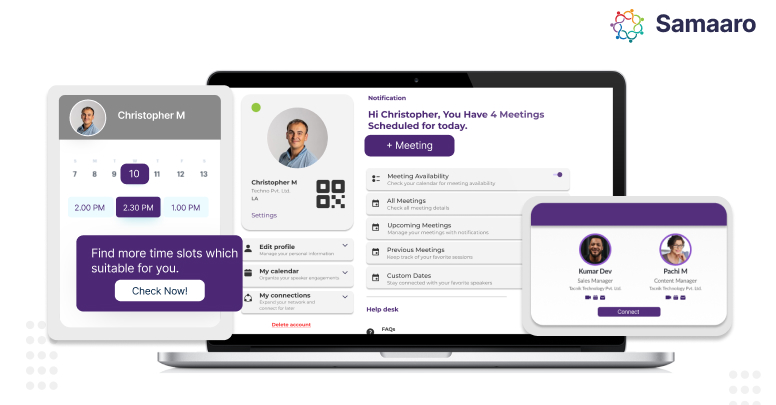
This is Samaaro’s most interactive and engaging feature. The pre-event meeting planner analyses attendee profiles and preferences using advanced AI algorithms. By accumulating and analysing information from registration forms and previous event interactions, the system can identify participants’ shared interests, goals, and objectives. It leverages advanced technology to connect attendees with the right people, generating engagement, enhancing attendee satisfaction, and offering a competitive edge to your event. This feature contributes to the success and expansion of your events, making them more valuable and memorable for all attendees.
Samaaro provides comprehensive tools for arranging transportation and lodging efficiently. Flights, trains, and ground transportation can be efficiently managed by event organisers, ensuring seamless departures and arrivals. It also permits the assignment of dedicated points of contact, thereby facilitating communication between event participants and staff. In addition, this feature enables precise monitoring of stay details, such as hotel reservations and check-in/check-out data. Overall, it simplifies logistics, thereby enhancing the experience of attendees and assuring a hassle-free event for all parties involved.
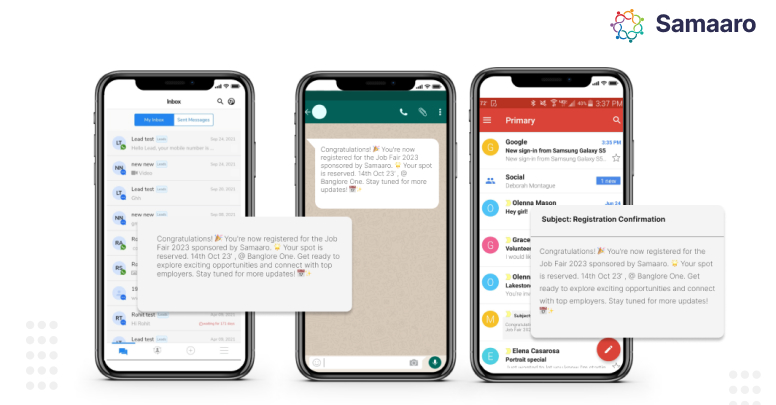
Samaaro provides integrated WhatsApp and SMS Marketing in addition to email marketing, whereas many EMS platforms only offer email marketing. This ensures that you reach participants via their preferred communication channels, thereby expanding the reach and impact of your event. This multi-channel strategy complements traditional email marketing and enables you to connect with a larger audience, ensuring that your event reaches its maximum potential.
Sponsorship management is the effective administration of the recipient relationships and contributions in the context of event or project planning. The Sponsorship Package Management tools provided by samaaro enable event organisers to design and customise sponsorship packages, as well as customise benefits and establish pricing structures. Integrated features, such as email templates and reminders, make it easier to communicate effectively with sponsors. The Tracking and Analytics functions of the software provide valuable insights into sponsorship progress and attendee participation.
In conclusion, Samaaro offers a feature-rich event management software platform that caters to the needs of event organizers of all sizes and experience levels. From facilitating ticketing and registration to managing speakers and sponsors, Samaaro provides the tools you need to streamline your event operations and create a memorable experience for your attendees.
Before you commit to using Samaaro for your next event, you can explore all of the features mentioned above by signing up for a free trial. This will allow you to see firsthand how Samaaro can simplify your event management process and take your events to the next level.

Built for modern marketing teams, Samaaro’s AI-powered event-tech platform helps you run events more efficiently, reduce manual work, engage attendees, capture qualified leads and gain real-time visibility into your events’ performance.
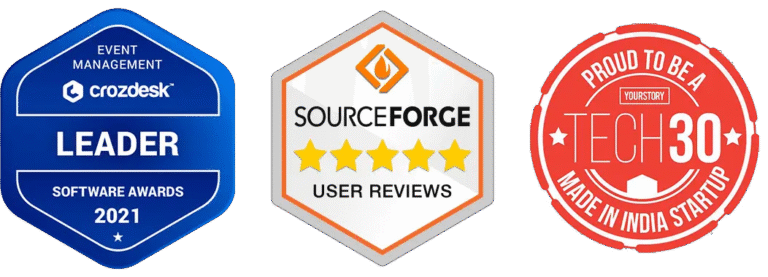
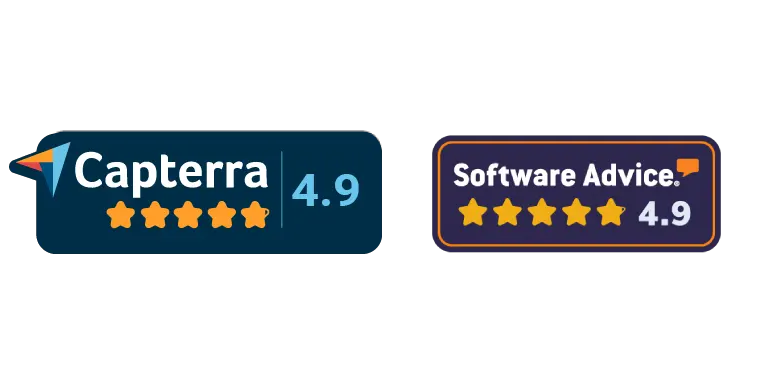
© 2025 — Samaaro. All Rights Reserved.